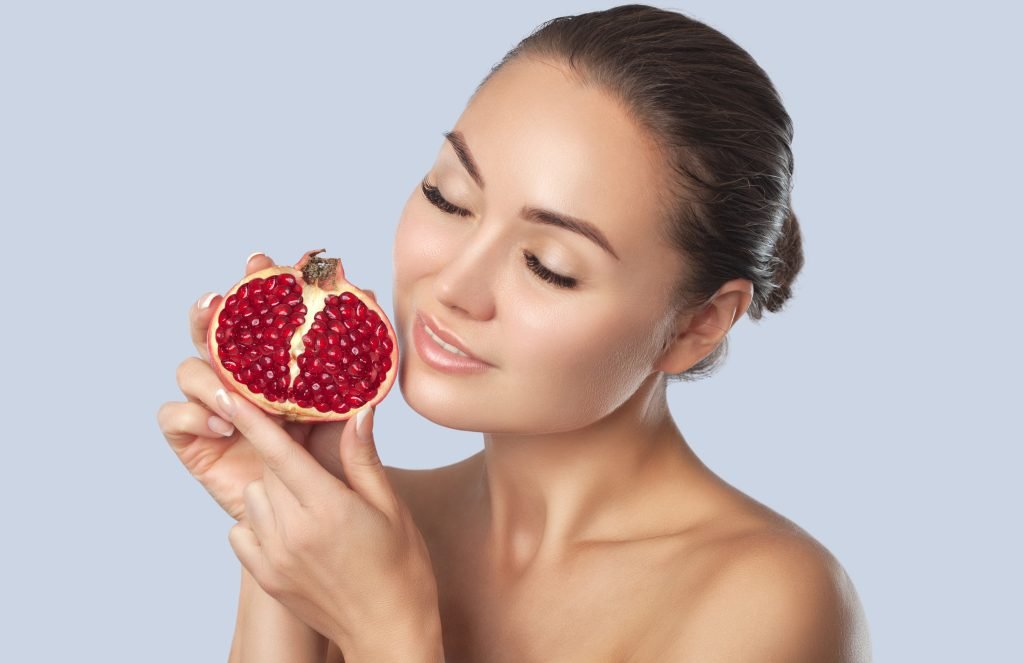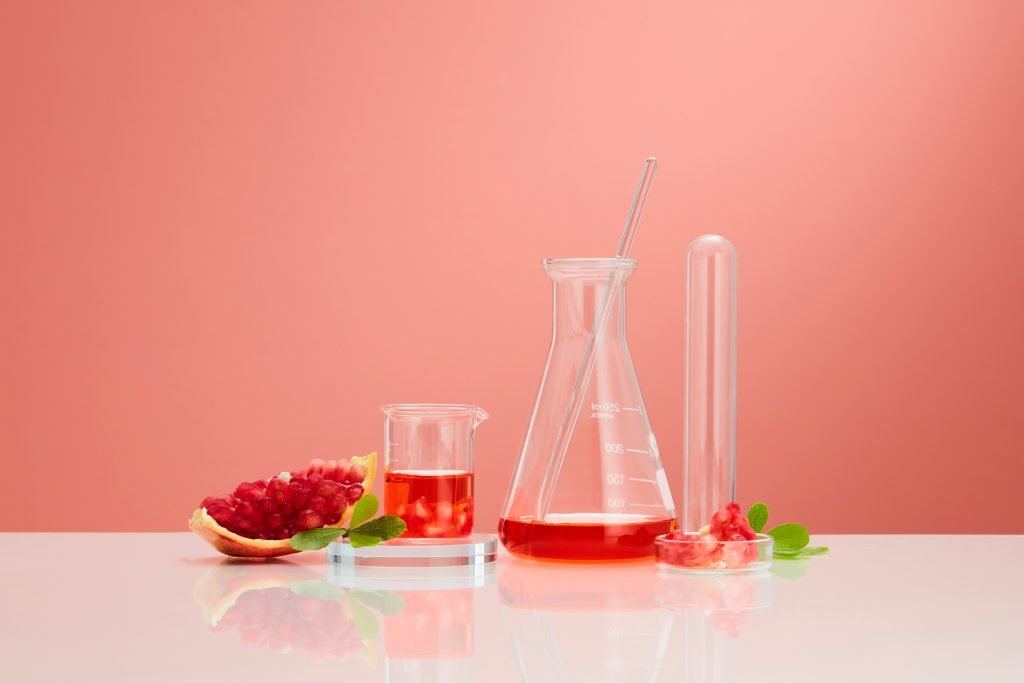Improve yourself and put an end to misconstructions!
Pomegranate is a fruit originating from the Middle East, where it is consumed fresh and used for the production of sweets and beverages such as juices, wines, and liqueurs. Besides being delicious, pomegranate stands out for its pharmacological benefits, which can be supportive in medications and an excellent ally in cosmetic formulations.
What is the fruit and its origin?
Among the various plant species with therapeutic potential, Punica granatum L., commonly known as pomegranate, is prominent. The pomegranate tree is to Asia. It grows in arid climates, during the hot months, and is widely distributed worldwide. Its a round fruit, with a hard, yellow-red skin that breaks open when ripe to reveal the seeds.
Which parts are used and where?
Various parts of the tree and the fruit, from the peel to the seeds, have been used since ancient times due to the diverse health benefits of pomegranate. Scientific studies have confirmed that pomegranate fruit has anti-inflammatory, antibacterial, and antioxidant properties. Particularly, cold-pressed pomegranate seed oil has high antioxidant activity.
How is the fruit used for the skin?
For skincare, pomegranate seed oil, pulp extract, and fruit peel powder are commonly used. Cold-pressed seeds provide highly pure oils widely used in cosmetic formulations. Pomegranate seed oil protects the skin from damage caused by ultraviolet radiation. It is a source of vitamins A, C, and B5, potassium, polyphenols like ellagic acid (an antioxidant), and fatty acids such as linoleic acid, oleic acid, and punicic acid, which help maintain the skin barrier, providing strength and radiance to the skin.
The oil extraction process is meticulous to preserve the beneficial properties of the seed. It starts with drying the seeds in an oven to remove all moisture, followed by grinding in a knife mill and crushing in a continuous hydraulic press. After pressing, the crude oil is decanted to remove impurities and stored at cold temperatures, ready for use.
What compounds and benefits enrich the fruit?

Rich in antioxidants such as Vitamin A and C, flavonoids, polyphenols, and tannins, pomegranate oil has the potential to reduce oxidative stress in cells, which elevates free radical levels responsible for premature skin aging. Thus, by aiding in the prevention of signs and fine lines, pomegranate oil is a potent antioxidant.
Pomegranate oil is rich in ellagic acid, which enhances glutathione levels, an antioxidant that protects cells from solar radiation, enhancing UV protection. Pomegranate oil is also an excellent ally for skin revitalization and rejuvenation due to the presence of fatty acids such as linoleic acid, oleic acid, and punicic acid, which accelerate skin healing, promote the synthesis of proteins like collagen, fibroblast proliferation, increasing elasticity and providing firmness and hydration to the skin.
In various studies, pomegranate oil has been shown to be effective as an antibacterial and anti-inflammatory agent. Topical use of pomegranate oil can help with marks left by blackheads and acne, eliminating acne-causing bacteria and controlling oiliness.
Synergy between Pomegranate Oil and Retinol

To further enhance the incredible antioxidant and invigorating properties of this fruit, it can be combined with a significant ally: Retinol.
Retinol, an active ingredient derived from Vitamin A, increases cell turnover and aids in the production of collagen, elastin, and hyaluronic acid to maintain skin firmness. It also possesses antioxidant properties that combat free radicals, reducing the appearance of fine lines, wrinkles, and dark spots. Retinol is also very effective in improving the appearance of blackheads and acne by cleansing pores, preventing recurrent skin inflammations. Retinol repairs skin aging damage and improves skin keratinization.
The combination of pomegranate oil with retinol goes beyond fighting free radicals, responsible for premature aging. This synergy also prevents loss of elasticity, sagging, and improves the appearance of wrinkles and spots, leaving the skin looking even, rejuvenated. This is because the anti-inflammatory and antioxidant activities are potentiated, leading to more significant and satisfying results in anti-aging treatments.
References:
COSTANTINI, S., RUSOLO, F., DE VITO, V., MOCCIA, S., PICARIELLO, G., CAPONE, F., … & VOLPE, M. G. Potential anti-inflammatory effects of the hydrophilic fraction of pomegranate (Punica granatum L.) seed oil on breast cancer cell lines. Molecules, v. 19, n. 6, p. 8644-8660, 2014.
DEGÁSPARI, C.H. ; DUTRA, A.P. FITOTHERAPEUTIC PROPERTIES OF POMEGRANATE (Punica granatum L.). Visão Acadêmica, 12(1), 2011. DOMINGOS, T. Pomegranate oil; Anti-aggression polysaccharide, activates cellular communication. Viafarma, São Paulo, 2012. Available at Accessed in August 2014.
JARDINI, F A and MANCINI, J. Evaluation of antioxidant activity in different extracts of pomegranate pulp and seeds (Punica granatum, L.). Rev. Bras. Cienc. Farm. 43 (1) • Mar 2007
